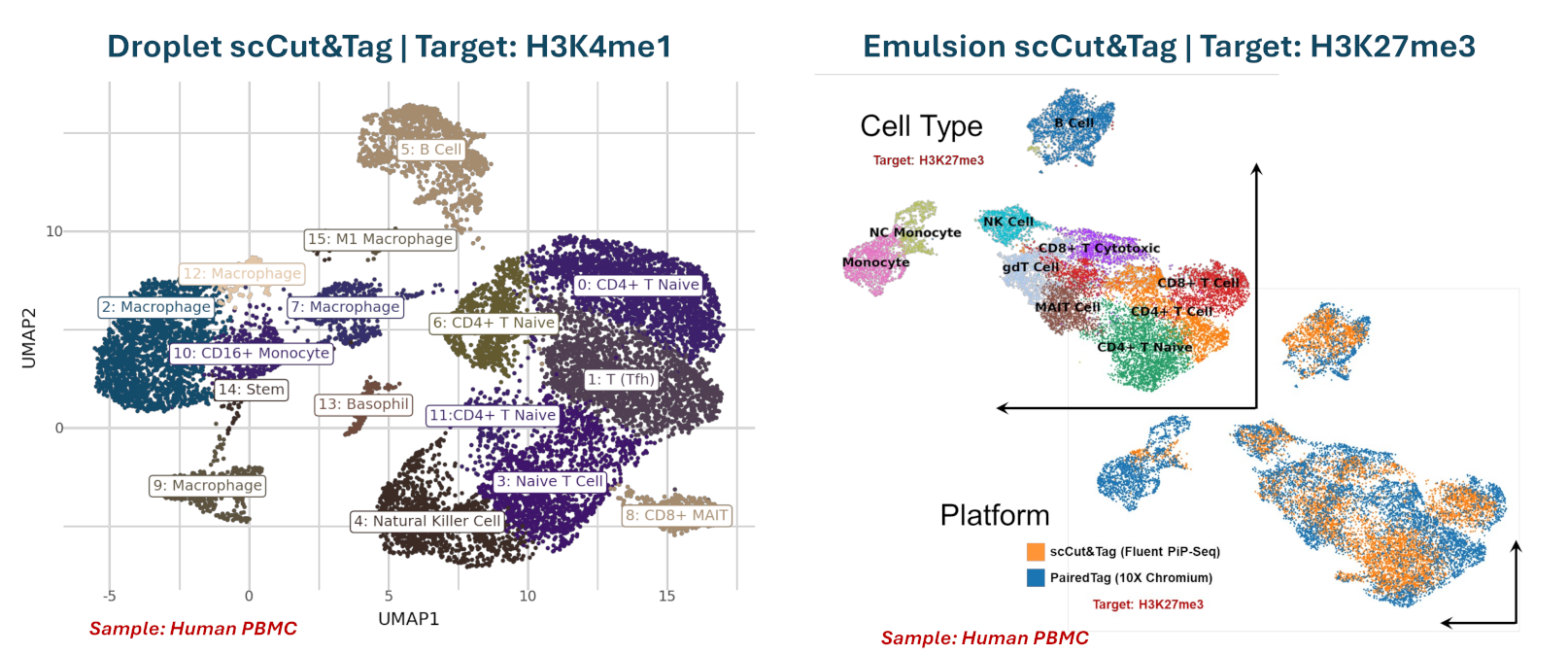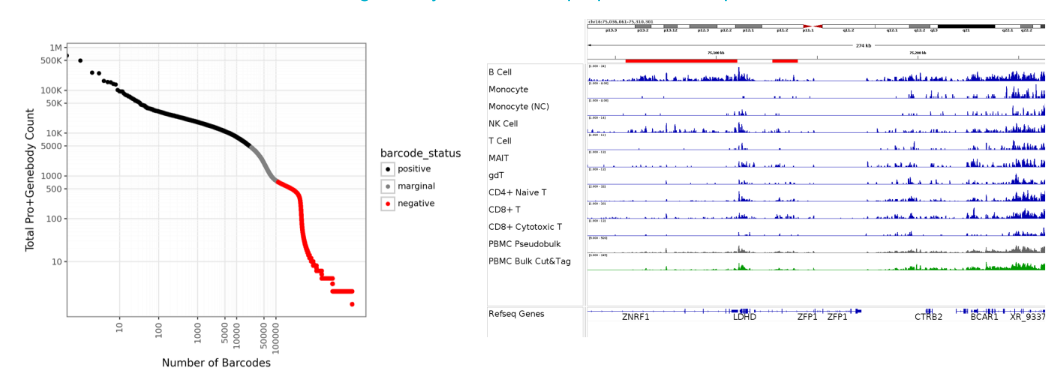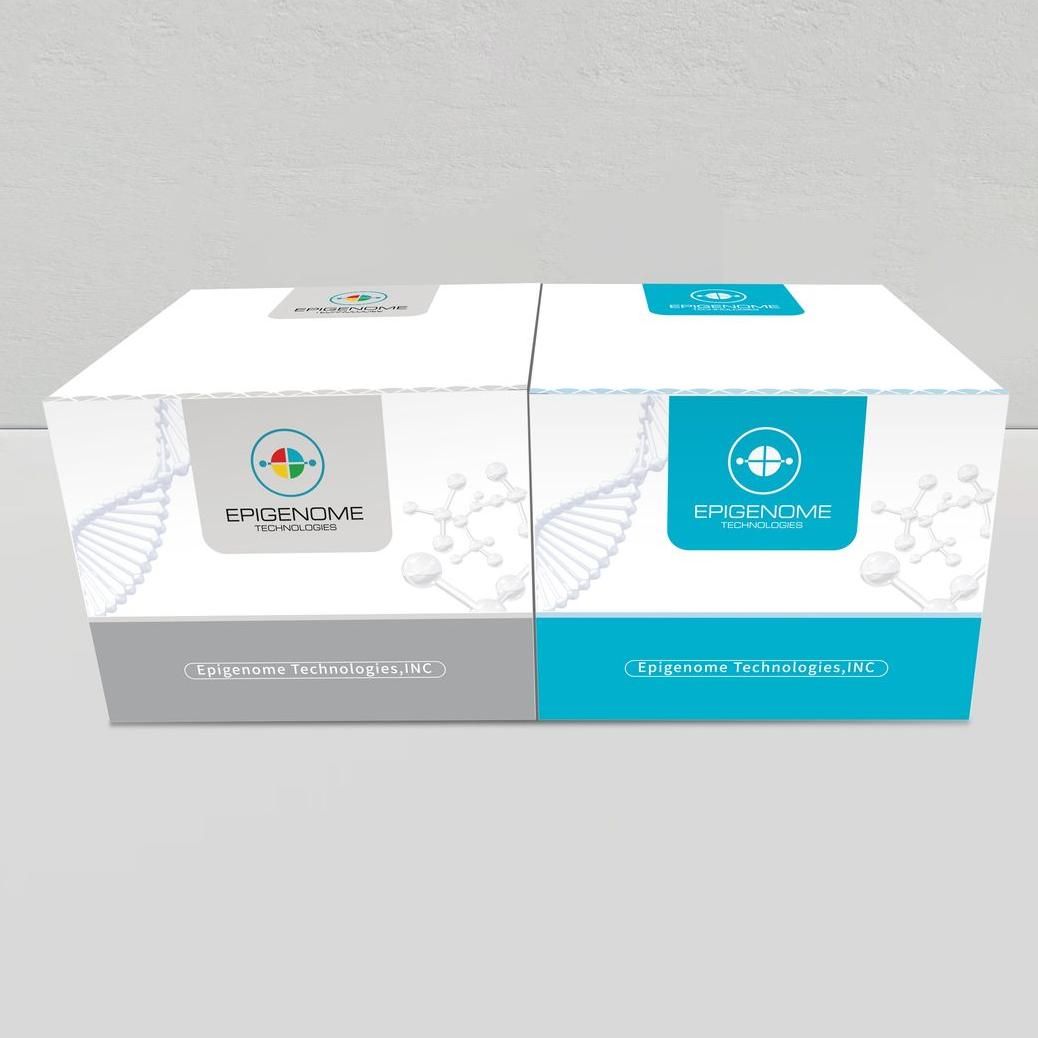Epigenome Technologies Droplet Single-Cell Cut&Tag Kit – 8rxn
Single-Cell CUT&Tag is an innovative assay that precisely measures epigenetic modifications in individual cells by targeting histone post-translational modifications (PTMs) or transcription factors (TFs). Unlike multiomic approaches that capture RNA, Single-Cell CUT&Tag focuses solely on tagmented DNA, allowing for deeper coverage of epigenetic marks without the complexity of concurrent transcriptomic profiling. This method is especially suited for studies in which RNA is either degraded (e.g., FFPE samples) or not required, including cell differentiation assays or drug-treatment experiments in cell lines. By integrating seamlessly with single-cell barcoding platforms — such as 10x Chromium® (ATAC) or Fluent PiP-seq® — Single-Cell CUT&Tag provides a high-resolution snapshot of gene regulatory states in each cell, driving new insights into how epigenetic changes shape biological responses.

Key Advantages
- ✅ Platform Compatibility: Utilize 10X Chromium or Fluent PiP-seq
- ✅ Flexible Profiling: Targets histone PTMs, TFs, or remodelers
- ✅ High Sensitivity & Resolution: Single-cell resolution without sorting
- ✅ Streamlined Workflow: Pre-optimized for leading single-cell systems

Application
Enhance your precision medicine research with the scCut&Tag Droplet - 8 Reaction Kit from Epigenome Technology. Bringing Cut&Tag epigenetic and TF profiling to single-cell resolution, this kit is compatible with the 10X Genomics droplet platform and allows you to profile histones, protein complexes, and TFs at an unprecedented single-cell level. Each kit provides up to 8 reactions, enabling analysis of up to 80,000 recovered cells, making it ideal for studying active marks or conducting well-characterized cellular experiments. Please note, the procedure requires a 10X Genomics ATAC kit.
Performance
- Recovery: 10,000+ cells per reaction
- UMI counts: 5000+ for broad marks, 1000+ for narrow marks
- Compatibility: fresh, frozen, and cryopreserved samples
- Accuracy: Highly Correlated (>98%) with matched bulk CUT&Tag

What You Need to Get Started
- Antibody: Validated primary antibody for target of interest
- Single-Cell Platform: 10x Genomics Chromium (ATAC) or Fluent PiP-seq system
- Reagents: 10x Genomics or Fluent Bio reagents for cell processing
- Sequencing: Illumina-compatible sequencing system
Company Profile
Epigenome Technologies emerged in 2022 as a spin-out from the pioneering Bing Ren lab at UC San Diego. Recognizing the transformative power of single-cell epigenetic profiling, our founders—Professor Bing Ren (UCSD epigenetics expert and former Harvard postdoc) and Pei Lin (with leadership experience at Illumina and the Salk Institute)—joined forces to brin g cutting-edge single-cell and spatial DNA-binding solutions to the broader research community.
Milestones & Achievements
- $6M in SBIR Grants: Sustaining robust R&D to enhance and expand our epigenetic toolkits.
- BRAIN Initiative: Our flagship technology, Paired-Tag, is actively utilized as part of this prestigious research program.
- High-Profile Publications: Our techniques feature in leading journals, including Nature Methods and Nature Communications, showcasing breakthroughs in single-cell epigenomics and metabolic stress response.
Technology & Differentiation
- First-Mover Advantage: We are among the very first to offer single-cell epigenetic profiling at scale, coupled with a unique multi-omic spatial solution.
- Broad Platform Compatibility: Seamless integration with numerous single-cell systems grants researchers the flexibility to choose a workflow that aligns with their lab infrastructure.
- Impact on Research & Medicine: By mapping regulatory mechanisms that underlie aberrant gene expression, we open new avenues for identifying therapeutic targets and delivering actionable clinical insights.
Our comprehensive approach to gene regulation sets us apart in a competitive biotech landscape. We’ve already proven that single-cell and spatial epigenetic profiling can unlock novel diagnostic markers and inform targeted therapies for conditions previously deemed intractable. As we continue to scale, we welcome conversations with potential acquirers and strategic partners who share our vision for revolutionizing the future of genomic research.

